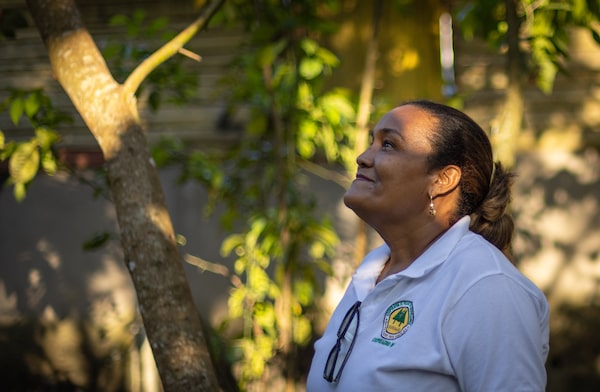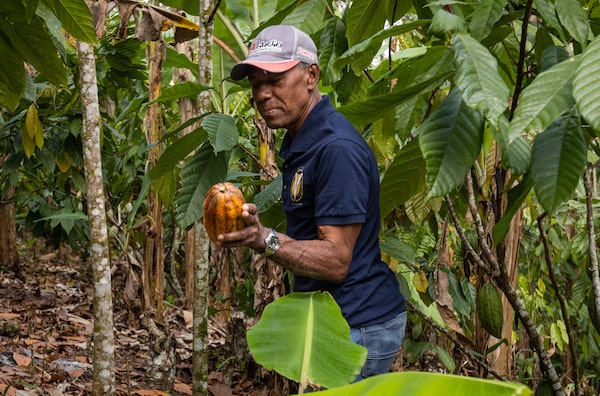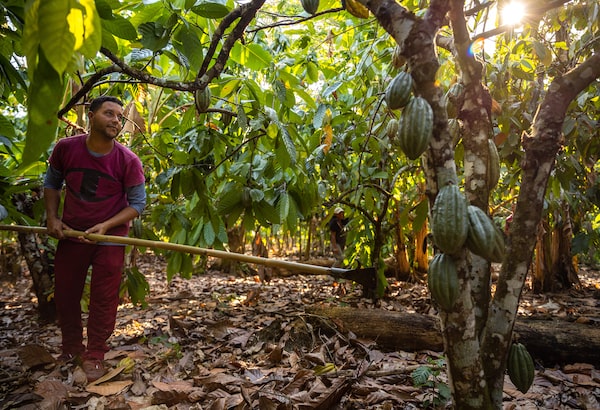Growing up in the verdant hill country of the Dominican Republic’s Duarte province, Marisol Villar and her four sisters used to receive a regular warning from their father: Whatever they did, they should never become a cocoa farmer like him. She followed his advice, going to university in Santo Domingo and finding work as an office administrator.
But when her father died of leukemia in 2013, Ms. Villar decided to take over the family farm after all.
Determined to boost productivity, she planted more trees and joined a farmer-owned co-op to get a better price for her cocoa. Convinced that her father’s cancer had been caused by the pesticides he sprayed, she eliminated them. Within a decade, the farm’s income more than doubled. For one, the lack of chemicals allowed Ms. Villar to label her product as organic, which fetches a higher price. And ironically, getting rid of artificial growing aids actually made the soil more productive over time.
“Our practices were killing the planet,” said Ms. Villar, 56, as she stood on her 13-hectare plot one sweltering spring afternoon. “We have to go back in time and relearn how to farm naturally.”
Just as she has succeeded in reversing one environmental catastrophe, however, another is threatening her livelihood. Persistent drought is killing off cocoa trees and causing the survivors to deliver less fruit. “It’s climate change. More and more trees are saying, ‘We can’t produce.’ And the fruit that does grow is drier and smaller,” she said.

‘More and more trees are saying “we can’t produce,”’ cocoa grower Marisol Villar says.
Such consequences of the climate crisis are hitting hard across the DR’s cocoa farms. Lengthy periods without rain mean reduced, lower-quality yields. Increasingly intense hurricanes, meanwhile, can wipe out thousands of trees.
Ms. Villar and her neighbours are rushing to adapt. They are planting more heat-resistant cocoa varietals, growing other fruits and vegetables to supplement their incomes, and expanding the forest cover on their land to reduce the amount of scorching sunlight. They don’t really have much choice: either mitigate the worst effects or give up producing one of the world’s most popular commodities.
“For the last decade, we’ve seen a steady decline in production. Every time we think, ‘Okay, it’s just been a bad year,’ it keeps going down,” said Basilio Almonte, a Fairtrade International official based in the Dominican; the country’s output has dropped from 115,000 tonnes of cocoa in 2015 to about 73,000 tonnes last year. “It’s too hot, there’s not enough rain and there are more hurricanes.”

Eusebio Lopez harvests a pod near Pimentel, east of San Francisco de Macoris.
Walking over dry, cracked earth on his hillside farm on a recent morning, Eusebio Lopez pruned trees and searched for ripe cocoa pods. Finding just one, the 71-year-old cut it open to reveal beans wrapped in soft, sweet white flesh. The moist covering is thinner than it should be, meaning the beans won’t ferment properly, producing lower-quality cocoa. “Things used to be much more predictable. We’d know when we’d have dry times or wet times. Now, months pass without rain,” he said.
Mr. Lopez knows that the solution is to replace older, dying trees with new, hardier varieties. The task is difficult, as it can take three years before a new tree bears fruit and decades for it to grow to maturity. “It means less production for a while,” said Miguilina Santos, 71, another farmer. “We know it’s for the best, but the need in our pocket is immediate.”

Ramon Mosquea holds up a sapling in a nursery in Hernando Alonzo, where a farmer co-operative is trying to design a more climate-resilient cocoa tree.

Eusebio Lopez harvests a pod in Pimentel, east of San Francisco de Macoris.
In the village of Hernando Alonzo, dotted with plank bungalows painted bright colours, the Conacado farmer co-operative is trying to make that switch easier. This is the home of an experimental farm, where the co-op grows climate-resilient trees for its members.
Hundreds of five-month-old saplings sit in small pots of dirt, covered by a black mesh canopy. The bottom halves of the trees are varietals that fare best in drought conditions. Attached to the top via rubber bands are cuttings from trees known to produce the largest fruit.
Using this grafting process, Conacado has managed to create about 60,000 hybrid trees for its members.
“It’s a huge challenge to adapt, but if we don’t start changing the way we produce cocoa, I don’t know what’s going to happen,” said the farm’s manager, Ramon Mosquea, 41.
In a nearby cinderblock building, the co-op also makes biofertilizer. Refuse from the harvest, such as husks of cocoa pods, is piled up in large concrete vats. For 30 or 40 days, the compost remains here and is periodically rotated to maintain moisture. After that, it is packed into bags and delivered to the co-op’s members.
“The idea is to give back to the farm what it gave,” Mr. Mosquea said.

On Ms. Villar's farm, Antonio Ortiz-Ventura helps out with harvesting. He farms his own land too.
At her farm, Ms. Villar can point to three-year-old saplings bearing their first cocoa pods, growing in the shade of storeys-tall trees planted by her great-grandfather.
When she took over this land, she was already determined to avoid the monoculture of the DR’s larger plantations. She interspersed the cocoa trees with tall caobas and pines, so that her spread looks like a natural forest. A few have split trunks or fallen boughs after being hit by tropical storms. She’s so far been relatively lucky: other cocoa farms have been destroyed by hurricanes.
The increased heat has meant that some trees produce continuously throughout the year, rather than stopping for periods of time as they did in the past, she said. This has led older trees to become exhausted and produce very little. She’s concerned that, this year, her farm will only yield about half of the 19,000 kilograms of cocoa it typically does, so severe have the effects of drought been.
In addition to bringing in new varietals of cocoa tree, Ms. Villar has also tried to diversify what she grows: bananas, corn, squash, guava, beans.
She thinks often of her father. He struggled to earn a living here, she said, something that she has so far been able to do thanks to her willingness to innovate. She will need all of this determination to change further in the years ahead. “My father never wanted us to be in cocoa because it was such a bad deal,” she said. “But it must be true what they say, that farming is in your blood.”
The trip to the Dominican Republic was partly funded by Bigger than Our Borders, an NGO-supported initiative urging the Canadian government to increase foreign-aid programs. They did not review or approve the article.